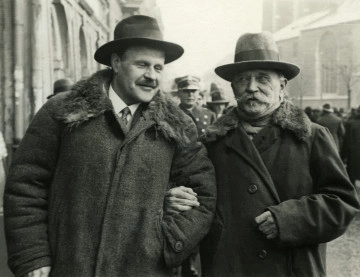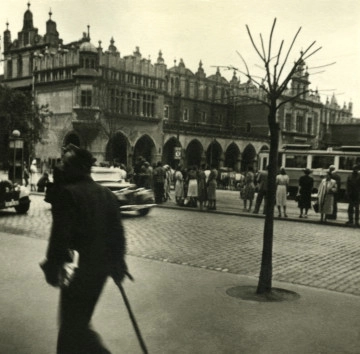
Henryk and Benedykt Tyszkiewicz in Cracow
XIX/XX wiek
Castle Museum in Łańcut
Part of the collection: Cartography
The 19th century was only a time of the industrial revolution, scientific and technical progress, and development of the state administration, but also the rise of interest in travelling the continent and beyond it. In the so-called “Century of Steam”, there was a rapid increase in the population of cities. The first cities with a population of a million appeared in Europe. This resulted in greater demand for detailed city plans and larger areas included as territorial administrative units. This map shows the Austro-Hungarian-Russian-German border at the beginning of the 20th century. In 1815, during the Congress of Vienna, the European powers established the Kingdom of Poland, dependent on Russian, from the third Prussian and Austrian Partitions. The rest of the land was divided between Russia, Austria and Prussia (from 1871 on, united Germany). The map is foldable and bound in a paper cover. The Counts Potocki – like most Polish aristocrats – liked to travel, hence a large collection of plans and maps has survived. Łukasz Chrobak
Author / creator
Object type
Cartography
Technique
flat print
Material
paper, paint
Creation time / dating
Creation / finding place
Owner
Castle Museum in Łańcut
Identification number
Location / status

nieznane
XIX/XX wiek
Castle Museum in Łańcut

nieznane
20th century
Castle Museum in Łańcut

20th century
Castle Museum in Łańcut
DISCOVER this TOPIC
National Museum in Lublin
DISCOVER this PATH
Educational path
0/500

We use cookies to make it easier for you to use our website and for statistical purposes. You can manage cookies by changing the settings of your web browser. More information in the Privacy Policy.
We use cookies to make it easier for you to use our website and for statistical purposes. You can manage cookies by changing the settings of your web browser. More information in the Privacy Policy.
Manage cookies:
This type of cookies is necessary for the website to function. You can change your browser settings to block them, but then the website will not work properly.
WYMAGANE
They are used to measure user engagement and generate statistics about the website to better understand how it is used. If you block this type of cookies, we will not be able to collect information about the use of the website and we will not be able to monitor its performance.